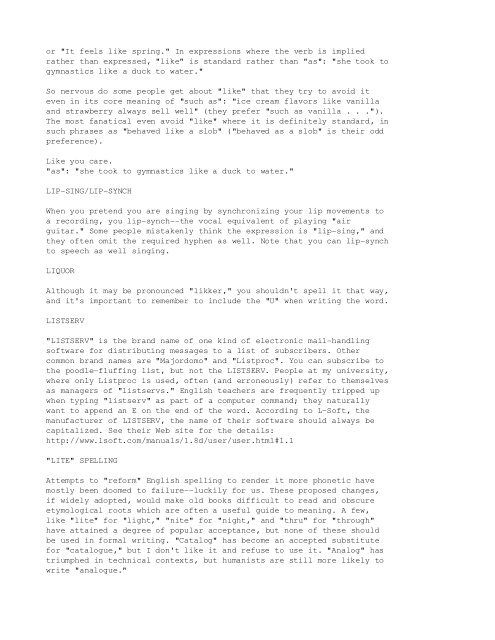Common_Errors_in_English_usage
Common_Errors_in_English_usage
Common_Errors_in_English_usage
You also want an ePaper? Increase the reach of your titles
YUMPU automatically turns print PDFs into web optimized ePapers that Google loves.
or "It feels like spr<strong>in</strong>g." In expressions where the verb is implied<br />
rather than expressed, "like" is standard rather than "as": "she took to<br />
gymnastics like a duck to water."<br />
So nervous do some people get about "like" that they try to avoid it<br />
even <strong>in</strong> its core mean<strong>in</strong>g of "such as": "ice cream flavors like vanilla<br />
and strawberry always sell well" (they prefer "such as vanilla . . .").<br />
The most fanatical even avoid "like" where it is def<strong>in</strong>itely standard, <strong>in</strong><br />
such phrases as "behaved like a slob" ("behaved as a slob" is their odd<br />
preference).<br />
Like you care.<br />
"as": "she took to gymnastics like a duck to water."<br />
LIPSING/LIPSYNCH<br />
When you pretend you are s<strong>in</strong>g<strong>in</strong>g by synchroniz<strong>in</strong>g your lip movements to<br />
a record<strong>in</strong>g, you lipsynchthe vocal equivalent of play<strong>in</strong>g "air<br />
guitar." Some people mistakenly th<strong>in</strong>k the expression is "lips<strong>in</strong>g," and<br />
they often omit the required hyphen as well. Note that you can lipsynch<br />
to speech as well s<strong>in</strong>g<strong>in</strong>g.<br />
LIQUOR<br />
Although it may be pronounced "likker," you shouldn't spell it that way,<br />
and it's important to remember to <strong>in</strong>clude the "U" when writ<strong>in</strong>g the word.<br />
LISTSERV<br />
"LISTSERV" is the brand name of one k<strong>in</strong>d of electronic mailhandl<strong>in</strong>g<br />
software for distribut<strong>in</strong>g messages to a list of subscribers. Other<br />
common brand names are "Majordomo" and "Listproc". You can subscribe to<br />
the poodlefluff<strong>in</strong>g list, but not the LISTSERV. People at my university,<br />
where only Listproc is used, often (and erroneously) refer to themselves<br />
as managers of "listservs." <strong>English</strong> teachers are frequently tripped up<br />
when typ<strong>in</strong>g "listserv" as part of a computer command; they naturally<br />
want to append an E on the end of the word. Accord<strong>in</strong>g to LSoft, the<br />
manufacturer of LISTSERV, the name of their software should always be<br />
capitalized. See their Web site for the details:<br />
http://www.lsoft.com/manuals/1.8d/user/user.html#1.1<br />
"LITE" SPELLING<br />
Attempts to "reform" <strong>English</strong> spell<strong>in</strong>g to render it more phonetic have<br />
mostly been doomed to failureluckily for us. These proposed changes,<br />
if widely adopted, would make old books difficult to read and obscure<br />
etymological roots which are often a useful guide to mean<strong>in</strong>g. A few,<br />
like "lite" for "light," "nite" for "night," and "thru" for "through"<br />
have atta<strong>in</strong>ed a degree of popular acceptance, but none of these should<br />
be used <strong>in</strong> formal writ<strong>in</strong>g. "Catalog" has become an accepted substitute<br />
for "catalogue," but I don't like it and refuse to use it. "Analog" has<br />
triumphed <strong>in</strong> technical contexts, but humanists are still more likely to<br />
write "analogue."





